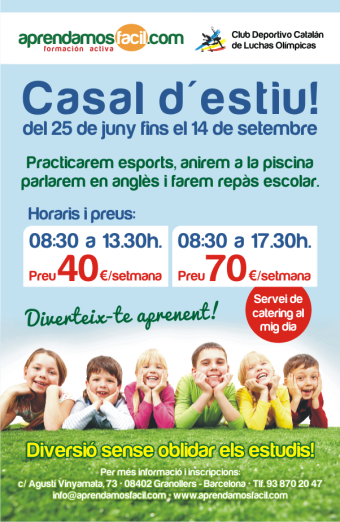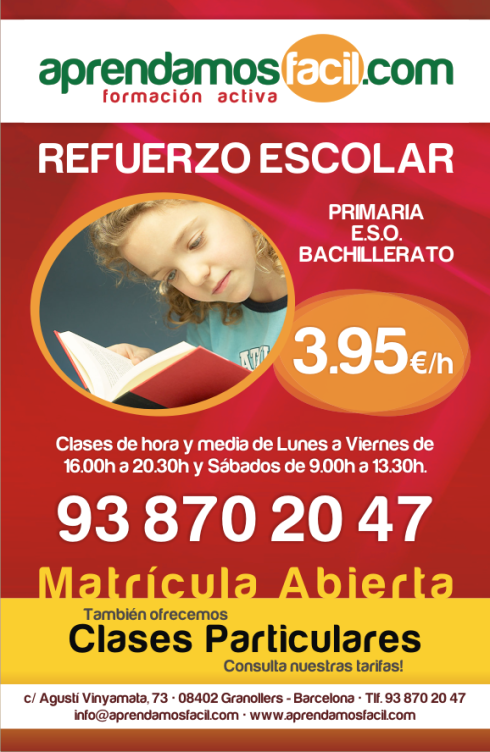Curso de francés para secundaria y bachillerato Granollers

Aprendamosfacil.com S.L.U
C/ Agustí Vinyamata, 73, 08402,Granollers, Bcn. Tels .: 938 702 047 – 67 61 89 763 Email.:info@aprendamosfacil.com
Ofrecemos clases y cursos de…
Idiomas Inglés, Francés, Alemán, Chino, Castellano, Catalán, Español para extranjeros
Ciencias Matemáticas, Física, Química, Naturales, Biología
Humanidades Sociales, Historia, Filosofía, Lengua Castellana y Literatura, Otras letras, Escritura, Oratoria y comunicación, Lectura, Lengua catalana y literatura
Prueba de acceso: Comunes : Matemáticas científicas y sociales , castellano, catalán, inglés
Específicas : Dibujo técnico , tecnología, química, biología, economía, francés, Filosofía.
Tecnología Dibujo técnico
Examenes Especiales GMAT, IELTS, TOEFL, Selectividad, Otros examenes, Pruebas de acceso, FCE First Certificate in English, CAE Certificate in Advanced English, CPE Certificate Proficiency in English, Graduado en ESO…
General General, Primaria y ESO, ESO y Bachillerato, Primaria, Ciclos Formativos
Ciencias socialesGeografía, Matemáticas aplicadas
Apoyo especial Técnicas de estudio, Problemas de aprendizaje
Economía y empresa Economía, Contabilidad, Administración de empresas
Casal de verano: Casal de verano, aula de verano, preparación de exámenes de septiembre,
The Exclamation Mark
The Exclamation
Mark
Use an exclamation point [ ! ] at the end of an emphatic declaration,
«No!» he yelled. «Do it now!»
An exclamation mark may be used to close questions that are meant to convey extreme emotion, as in
What on earth are you doing! Stop!
An exclamation mark can be inserted within parentheses to emphasize a word within a sentence.
We have some really(!) low-priced rugs on sale this week.
An exclamation mark will often accompany mimetically produced sounds, as in
«All night long, the dogs woof! in my neighbor’s yard» and
«The bear went Grr!, and I went left.»
If an exclamation mark is part of an italicized or underlined title, make sure that the exclamation mark is also italicized or underlined:
My favorite book is Oh, the Places You’ll Go!
(Do not add a period after such a sentence that ends with the title’s exclamation mark. The exclamation mark will also suffice to end the sentence.) If the exclamation mark is not part of a sentence-ending title, don’t italicize the exclamation mark:
I’ve asked you not to sing la Marseillaise!
In academic prose, an exclamation point is used rarely, if at all, and in newspaper writing the exclamation point is virtually nonexistent.
The Period
The Period
Use a period at the end of a command.
- Hand in the poster essays no later than noon on Friday.
- In case of tremors, leave the building immediately.
Use a period at the end of an indirect question.
- The teacher asked why Maria had left out the easy exercises.
- My father used to wonder why Egbert’s ears were so big.
Use a period with abbreviations:
- Dr. Espinoza arrived from Washington, D.C., at 6 p.m.
Notice that when the period ending the abbreviation comes at the end of a sentence, it will also suffice to end the sentence. On the other hand, when an abbreviation ends a question or exclamation, it is appropriate to add a question mark or exclamation mark after the abbreviation-ending period:
- Did you enjoy living in Washington, D.C.?
Occasionally, a statement will end with a question. When that happens, it is appropriate to end the sentence with a question mark.
- We can get to Boston quicker, can’t we, if we take the interstate?
- His question was, can we end this statement with a question mark?
- She ended her remarks with a resounding why not?
PRONUNCIATION
|
LONG DIPHTHONGAL “ A “ — SE PRONUNCIA EN ESPAÑOL “ EI “
Name tame lame shape came plate
Made fame cave cane same lake
Gave wave safe slate brave grape
Game shade save skate brake shame
|
CAN
|
CAN is special verbs because has NO inflection to show the gender and the number. . In all the persons IT will be the same.
e.g , CONJUGATION : CAN
This is called INDICATIVE MOOD IN PRESENT TENSES.
|
account
account verb accounts; account·ed; account·ing
1 account for (something) a : to give a reason or explanation for (something)
▪ Eventually, you will need to account for your actions/behavior. ▪ How do you account for [=explain] your success? ◊The informal saying there’s no accounting for taste means that there is no way to understand why some people like something while other people do not.
▪ I don’t see why they liked the movie, but there’s no accounting for taste.
b : to be the cause of (something)
▪ The disease accounted for over 10,000 deaths last year. ▪ These new features account for the computer’s higher price. ▪ The disease cannot be accounted for [=explained] by genetics alone. There must be other causes as well.
c : to make up or form (a part of something)
▪ Women account for [=constitute, compose] only 25 percent of our employees.
d US : to think about (something) before doing something : to take (something) into consideration
▪ The researchers failed to account for the fact that most of the students were poor.
2 account for (someone or something) a : to show what happened to (someone or something)
▪ We have to account for the time [=to say how much time] we spend on each activity. ▪ I’ll have to account for the money I spent. : to know the location of (someone or something) ▪ The government couldn’t account for millions of dollars of the taxpayers’ money. ▪ Is everyone accounted for? [=do we know where everyone is?] ▪ All present and accounted for. [=everyone who is supposed to be here is here]
b : to destroy or kill (someone or something)
▪ Enemy fighters have accounted for most of our bombers, Sir. ; also chiefly Brit : to defeat or beat (someone or something)
▪ We accounted for [=dispatched] the challengers 3–2.
prioritize
pri·or·i·tiz·es; pri·or·i·tized; pri·or·i·tiz·ing
1 : to organize (things) so that the most important thing is done or dealt with first [+ obj] ▪ It’s always difficult to prioritize work, school, and family. [no obj] ▪ If you want to do your job efficiently, you have to learn to prioritize.
2 [+ obj] : to make (something) the most important thing in a group
▪ The town council hopes to prioritize the bridge construction project at the next meetin
TONGUE TWISTER
TO CUDDLE
cud·dles; cud·dled; cud·dling
▪ He cuddled the puppy.
2 [no obj] : to lie or sit close together
▪ Let’s cuddle by the fire. — often + up ▪ They cuddled up under the blanket. ▪ They cuddled up to each other. ▪ He cuddled up with a good book. [=he sat down in a comfortable position and began reading a good book]
▪ She gave the children a cuddle.
PHRASAL VERBS – COME
come  /ˈkʌm/ verb comes; came
/ˈkʌm/ verb comes; came  /ˈkeɪm/; come; com·ing
/ˈkeɪm/; come; com·ing
1 : to move near to someone or something : to approach someone or something
▪ He came (right) up (to me) and introduced himself.
2 a : to be mentioned or thought of
▪ That issue never came up. [=arose] ▪ A question has come up about the budget. ▪ I was surprised when his name came up as a possible candidate for the job.
b : to occur in usually a sudden or unexpected way
▪ She seems to be ready to deal with any problem that may come up. [=arise] ▪ Something has come up and I won’t be able to attend the meeting. ▪ We need to be ready to take action if an opportunity comes up.
3 of the sun or moon : to become visible in the sky : to rise
▪ She was already awake when the sun came up.
4 of a plant : to first appear above the ground
▪ in the spring, when the daffodils and tulips are coming up
5 : to finish in a specified condition or state
▪ I flipped the coin and it came up heads/tails. ▪ The shot came up short. [=the shot did not go far enough]
6 : to move up in rank or status
▪ an officer who came up from/through the ranks [=who started as an ordinary soldier and rose to become an officer]
7 ◊Something that is coming up will happen soon or will appear soon.
▪ With the election coming up, both candidates are spending all their time on the campaign trail. ▪ Our interview with the mayor is coming (right) up after this commercial. ▪ “I’d like a turkey sandwich and a glass of lemonade, please.” “Coming right up!” [=the sandwich and lemonade will be served to you very quickly]
▪ The proposal has come up against some opposition. [=there is some opposition to the proposal]
▪ The police searched the area for clues but came up empty. [=they did not find any clues]
1 come upon (someone or something) : to meet or find (someone or something) by chance
▪ As they turned the corner, they came upon an unexpected scene. ▪ While researching the town’s history, she came upon some surprising new information about its first mayor.
2 come upon (someone) of a feeling : to affect (someone) suddenly
▪ An urge to travel suddenly came upon him. [=he suddenly felt an urge to travel]
▪ The movie didn’t come up to our expectations. [=was not as good as we expected it to be]
▪ We finally came up with a solution (to our problem). ▪ He came up with an interesting new method of improving the factory’s efficiency. ▪ He’ll be in a lot of trouble if he doesn’t come up with the money he owes.
▪ He promised to support her, come what may.
easy come, easy go


















